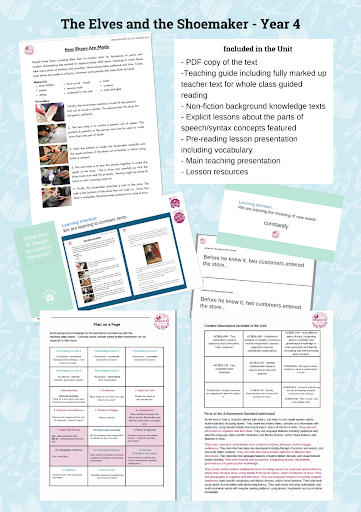Anatomy of an effective English unit of work

We have recently heard much about teacher workload in the media. Teachers being time poor is not news to any of us. It’s just taken a teacher shortage for the rest of the world to figure it out! One of the suggestions that have been made is that teachers be provided with ready-made resources and units of work to ease the planning pressure. I’m a huge fan of this idea. As a teacher, I adore having high quality, premade resources at my fingertips. I value knowledge rich information texts and well-thought-out lesson suggestions that are ready to go when I am planning a unit of work. However, in order for a unit to be useful for me, I like it to have the following features.
- Not too complicated. I need a balance of comprehensive and easy to read/digest.
- A targeted focus on the content descriptors/concepts being taught. When you have 10 outcomes for a unit, everything becomes way too complicated.
- Written according to an explicit teaching model, featuring lesson structures that provide structure and scaffolding for all students. Inquiry based units just don’t do it for me.
- Background knowledge and skills are actively taught rather than there being an assumption that children will ‘pick them up’ by participating in the lessons.
- Comes with lesson resources made, especially the things that will be displayed. However, I don’t want a billion worksheets!
- Options for assessment rather than proscribed tasks. I like to be able to make decisions about this based on the needs of students.
- Clear lines of sight to the achievement standard I need to grade against.
That’s quite a list! However, I think it’s important for us to be clear about what is most important to us when we seek resources to support our teaching. There isn’t a one size fits all approach that is going to work for every classroom and every teacher in every circumstance. That’s why simple, quality, core materials are so important.

When it comes to teaching English, I’ve long preferred units of work based in one core (target) text as the stimulus for a whole bunch of learning. Not that you won’t read other texts along the way, but children need context and time to really understand a text and develop skills, so I like to give it to them. What do I put in a unit?
- One text level, sentence level and word level goal with a clear line of sight between them. For example, we may explore adjectives, look at how we use them in the context of complex sentences and then put it all into action to write great descriptions of the setting.
- Non-fiction background knowledge texts (I write them myself because it’s hard to find things that exactly match the connections you are trying to make)
- Vocabulary lessons including examining the words from multiple perspectives (definition, use, morphology, synonyms, antonyms, phoneme/grapheme correspondences and other words that might exist in the same morphological word family.
- Basic comprehension questions as well as more thought provoking queries that students tackle after they have learned background knowledge and vocabulary and explored the text.
- A drama activity to get kids involved and engaged in the text
- Opportunities to make connections with own experiences and other texts
- Discussion and exploration of audience and purpose
Then, depending on the focus of the unit:
- Text structure
- Parts of speech
- Syntax
- Literary and language devices
- The interplay between visual and text aspects
With:
- The opportunity to express a preference and identify why or why not students like a text
- An extended writing task that connects to the target text so that you can assess both reading comprehension and writing skills
I also want all of this to be connected to the achievement standard that I will be grading against. Trying to teach from one thing and then assess and grade another is a recipe for confusion.
That’s why I am writing the units for the Resource Room (available from October 1st, 2022) in the way that I am. They are no-nonsense, rich and focused on helping both you and your students to feel like pros, all while saving you time and cognitive load.
Looking for pre-written text based units that save you the time and cognitive load of writing your own? The Resource Room has you covered.


 Jocelyn Seamer Education
Jocelyn Seamer Education
1 comment
I CAN'T WAIT for the Resource Room to OPEN!
Leave a comment